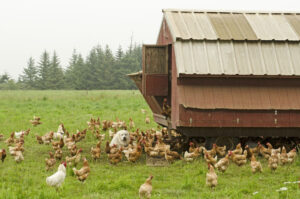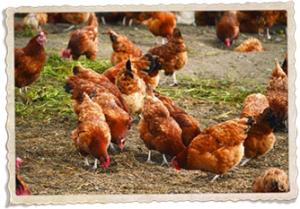When setting up a chicken coop, ventilation often takes a backseat to concerns about predators or the elements. But proper ventilation is just as crucial for your flock’s health and well-being. Let’s explore why it’s so essential and how to ensure your coop has adequate airflow.
Understanding the Importance of Ventilation
Ventilation is vital for several reasons:
- Regulating Temperature: Chickens generate a lot of heat, especially when packed together in a coop. Proper ventilation helps keep the temperature within a comfortable range, preventing overheating in summer and allowing moisture to escape in winter.
- Reducing Humidity: Chickens also produce a lot of moisture through breathing and droppings. Ventilation prevents humidity buildup, which can lead to health issues like respiratory problems or frostbite in cold weather.
- Improving Air Quality: The ammonia from chicken waste can build up in a poorly ventilated coop, causing respiratory damage and irritating the eyes of your birds. Good airflow ensures these harmful gases are dispersed.
How to Properly Ventilate Your Coop
Here’s how to ensure your chicken coop has the right amount of ventilation:
- Position of Vents: Ventilation openings should be placed high, usually at or near the roof. This setup allows the warm, moist air to escape while drawing in cooler, drier air.
- Sizing the Vents: A general rule of thumb is to provide at least 1 square foot of ventilation per 10 square feet of coop floor area. However, in hotter climates, you may need more.
- Adjustable Vents: Make sure your vents are adjustable. This will allow you to regulate airflow depending on the weather and the season.
- Predator Protection: Any ventilation openings need to be predator-proof. Cover the vents with hardware cloth to keep predators out while allowing air to flow in.
Troubleshooting Ventilation Issues
Look out for signs that your coop might need better ventilation:
- Condensation: If you see condensation on the inside of your coop, it’s a sign that your ventilation is inadequate.
- Smelly Coop: A well-ventilated coop should not smell. If you’re noticing a strong odor, it might be due to poor airflow.
- Respiratory Issues: If your flock has frequent respiratory problems, it could indicate that the coop’s air quality is poor and needs more ventilation.
Proper ventilation is key to keeping your flock healthy and comfortable. By understanding its importance and implementing the right strategies, you can ensure your coop provides the optimal environment for your chickens.
Need help choosing the right coop or planning for your flock’s needs? At Chickens for Backyards, we’re here to help you at every step of your chicken-raising journey. Visit our website for advice, resources, and a wide range of backyard-friendly chicken breeds to choose from.

